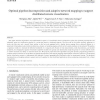Free Online Productivity Tools
i2Speak
i2Symbol
i2OCR
iTex2Img
iWeb2Print
iWeb2Shot
i2Type
iPdf2Split
iPdf2Merge
i2Bopomofo
i2Arabic
i2Style
i2Image
i2PDF
iLatex2Rtf
Sci2ools
JPDC
2007
2007
Optimal pipeline decomposition and adaptive network mapping to support distributed remote visualization
This paper discusses algorithmic and implementation aspects of a distributed remote visualization system that optimally decomposes and adaptively maps the visualization pipeline to a wide-area shared or dedicated network. The first node of the system typically generates or stores raw data sets, and a remote client resides on the last node equipped with a display device ranging from a personal desktop to a powerwall. Intermediate nodes include workstations, clusters, or rendering engines, which can be located anywhere on the network. We employ a regression method to estimate the effective bandwidth of a transport path. Based on link measurements, node characteristics, and module properties, we strategically organize visualization pipeline modules into groups and dynamically assign the groups to various network nodes to achieve minimal total delay or maximal frame rate. We propose polynomial-time algorithms using the dynamic programming method to compute optimal solutions for the probl...
| Added | 16 Dec 2010 |
| Updated | 16 Dec 2010 |
| Type | Journal |
| Year | 2007 |
| Where | JPDC |
| Authors | Mengxia Zhu, Qishi Wu, Nageswara S. V. Rao, S. Sitharama Iyengar |
Comments (0)

